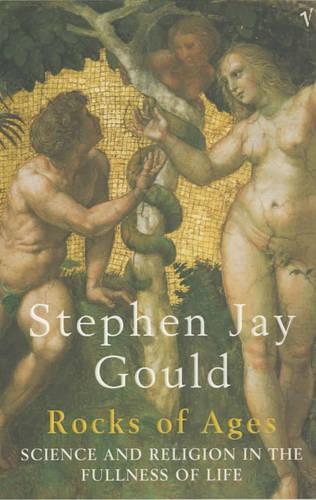Overview
' Rocks of Ages is vintage, spell-binding Stephen Jay Gould, challenging, passionate and beguiling' The Times Writing with characteristic bracing intelligence and clarity, Gould sheds new light on a dilemma that has plagued thinking people since the Renaissance. Instead of having to choose between science and religion, Gould asks, why not opt for the golden resolution that accords dignity and distinction to both? In elaborating and exploring his thought-provoking concept, Gould delves into the history of science with stories of figures as Galileo and Darwin, and concludes that science defines the natural world, and religion our moral world.
Full Product Details
Author: Sj Gould ,
Stephen Jay Gould
Publisher: Vintage Publishing
Imprint: Vintage
Dimensions:
Width: 12.90cm
, Height: 1.60cm
, Length: 19.80cm
Weight: 0.181kg
ISBN: 9780099284529
ISBN 10: 0099284529
Pages: 256
Publication Date: 07 February 2002
Recommended Age: From 0 years
Audience:
General/trade
,
Professional and scholarly
,
College/higher education
,
General
,
Professional & Vocational
Format: Paperback
Publisher's Status: Active
Availability: Manufactured on demand

We will order this item for you from a manufactured on demand supplier.
Reviews
Gould is at his brilliant best... A truly convincing performance Guardian Convincingly argued and thought provoking-Gould must rank as one of the leading scientific essayists of his generation and, as ever, he is in total command of his subject matter. He steers a deft route through contentious waters, but manages to retain a humorous edge, that keeps the book both engaging and highly entertaining. Gould provides the literary magic to deliver a light-hearted read Irish Times Concise, eloquent and passionate. It is a marvellous work. Gould speaks clear, sound sense, and Rocks of Ages should be required reading not only for scientists and religious people, but for anybody who cares about the quest for meaning Independent This marvellous extended essay should have been the real lost book of the New Testament. Gould, arguably our greatest living popular science essayist, has many joyful enthusiasms. Among them are eternity, Charles Darwin and baseball-Gould has such insatiable and infectious enthusiasm for the intellectual challenge and fascination of being a mere speck in a vast universe Scotsman Rocks of Ages is easy and enjoyable to read. It contains many charming illustrations and interesting insights Sunday Telegraph
Gould is at his brilliant best... A truly convincing performance * Guardian * Convincingly argued and thought provoking-Gould must rank as one of the leading scientific essayists of his generation and, as ever, he is in total command of his subject matter. He steers a deft route through contentious waters, but manages to retain a humorous edge, that keeps the book both engaging and highly entertaining. Gould provides the literary magic to deliver a light-hearted read * Irish Times * Concise, eloquent and passionate. It is a marvellous work. Gould speaks clear, sound sense, and Rocks of Ages should be required reading not only for scientists and religious people, but for anybody who cares about the quest for meaning * Independent * This marvellous extended essay should have been the real lost book of the New Testament. Gould, arguably our greatest living popular science essayist, has many joyful enthusiasms. Among them are eternity, Charles Darwin and baseball-Gould has such insatiable and infectious enthusiasm for the intellectual challenge and fascination of being a mere speck in a vast universe * Scotsman * Rocks of Ages is easy and enjoyable to read. It contains many charming illustrations and interesting insights * Sunday Telegraph *
In this book, essayist and palaeontologist Stephen Jay Gould describes and defends the 'NOMA Principle' in an attempt to resolve what he sees as the illusory conflict between science and religion. The term is a contraction of the phrase 'Non-Overlapping Magisteria', which enlarges a concept familiar to students of the philosophy of science - you can't use the tools from one sphere of inquiry to unearth meaningful information about another. A magisterium, defined in the Preamble as 'a domain where one form of teaching holds the appropriate tools for meaningful discourse and resolution', is a self-contained area of exploration with its own terms and rules: Gould argues that science and religion are two such magisteria, the natural world being the domain of science, and the moral world the stamping ground of religion. He presents his argument clearly and forcibly, drawing in the process on famous events and figures from the history of both disciplines. Gould delights in pointing up the marginality of so-called staple instances of science at war with religion - the flat earth myth, we find, is just that: an apocryphal tale which gained a sudden currency in the wake of 19th-century populist fervour - and does so with his customarily sparky conversational tone. He has the gift of making his reader think: he never lauds his obvious intelligence and speaks simply and passionately. Aside from a brief descent into witheringly sarcastic creationist-bashing, all angles of the science/religion quandary are treated sympathetically before being shown to be symptomatic of one great misconception: science and religion as warring factions, rather than independent, respectfully coexistent, fields of investigation concerned with separate areas of human existence. Entertaining and convincing stuff. (Kirkus UK)
Author Information
Stephen Jay Gould (1941-2002) was the Alexander Agassiz Professor of Zoology and Professor of Geology at Harvard University and the curator for invertebrate palaeontology in the University's Museum of Comparative Zoology. He is the author of over twenty books, and received the National Book Award, the National Book Critics Circle Award, and the MacArthur Fellowship. He died in May 2002.



